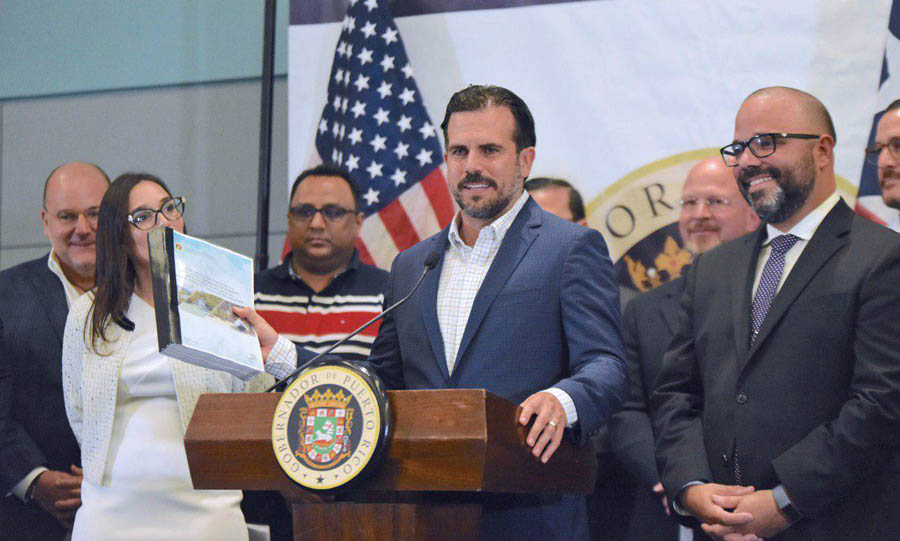New permit regulations limit power of P.R.’s autonomous municipalities

By Jeniffer Wiscovitch and Angélica Serrano-Román
Center for Investigative Journalism
The new permit regulations approved by Gov. Ricardo Rosselló, which repeals municipal regulations, could be a new minefield between the executive and the mayors, since it seeks to override the Autonomous Municipalities Law.
This, despite the fact that the Permit Reform Act of 2009, under which the regulation is created, does not have any section that mandates the repeal of municipal regulations, an investigation by the Center for Investigative Journalism (CPI, for its initials in Spanish) uncovered.
University of Puerto Rico Law School professor William Vázquez-Irizarry predicted this, saying “the recently approved Joint Regulation aims to repeal in general terms the permits regulations approved by municipalities that have received authority to address these issues under the Autonomous Municipalities Act of 1991.”
The professor of administrative and constitutional law also said with the new regulation, the government is forcing all municipalities to have to use a single document to issue their permits.
The professor added that the municipalities should examine with caution the imposition of this regulation “given the possibility that it can be challenged in the courts.”
In addition, he said although municipalities can continue making decisions regarding permits, the central government is imposing the process and the parameters they must follow to grant permits.
“This situation and controversy should not be a surprise if we consider the impairment suffered by the municipal autonomy public policy during the past decades,” said the author of articles on consultation and citizen participation in the process of adopting administrative regulations in Puerto Rico.
Meanwhile, Manuel Laboy, secretary of the Department of Economic Development and Commerce (DDEC for its initials in Spanish,) pointed out that the joint regulation will apply to all municipalities, regardless of whether they are autonomous and have their own permit offices.
Likewise, María Cintrón-Flores, assistant secretary of the Office of Permits Management, said although the autonomous municipalities’ permits offices will be governed by the new regulation, they will continue to evaluate and grant permits.
“They [the offices] follow their normal course, but with a single basis to evaluate the procedures,” she said.
Rosselló was not able to confirm the opinion of the mayors about the repeal of the municipal regulations, saying that now there will be only one regulation because “this is what it takes for it to be a more agile system.”
Sweeping clause included
Cintrón-Flores added there is a clause in the new regulation that repeals all the others and makes it the only applicable one. Similarly, the official said the platforms that municipalities had for the procedures can no longer be used, and that all processes will be done through the Single Business Portal.
Laboy said they have been in “constant dialogue” with the municipalities.
“They are already ready to adopt the digital portal. All of the municipalities are already integrated and were waiting for this joint regulation to be presented,” he said.
Puerto Rico Mayors Federation president Carlos Molina, told the CPI that, on the contrary, the federated municipalities did not participate in any meeting before the approval of the joint regulation was announced. He stressed that they will request training for the use of the Single Business Portal’s tools.
“The autonomous capacity of the municipalities is legally governed, and no regulation can go above the law, so for now it is understood that the autonomous municipality still has the same level of discretion and decision,” said Molina regarding the role the autonomous municipalities continue to have.
However, the mayor said: “The Puerto Rico Mayors Federation supports any governmental proposal aimed at streamlining the permits approval procedures. This with the goal of stimulating job creation and the economic development of the cities.”
Meanwhile, Puerto Rico Mayors Association President José Román-Abreu said the Autonomous Municipalities Law establishes that municipalities that have reached the fifth level of hierarchy have the power to issue permits.
“We will fight Any measure that tries to eliminate the municipalities’ rights or prerogatives,” he said.
He noted there are municipalities that have come together to manage permits such as the ABC Consortium, which includes Aibonito, Barranquitas and Comerío, and the CCVS, which includes Caguas, Cayey, Villalba and Salinas.
Rosselló signed the regulation on May 8, two days after the CPI reported that the document had not been approved, as well as the problems faced by micro and small entrepreneurs to obtain their permits. Although citizens will have 30 days to comment on 788-page regulatory document, it took effect immediately.
This will give way to the implementation of the Single Use Permit, among other measures that seek to expedite the island’s permitting process.





